In today’s world, conversations about firearms and self-defense often ignite political debates and polarizing rhetoric. But at its core, the act of protecting oneself and one’s loved ones transcends politics – it’s an ancient, biological responsibility. For men striving to cultivate and preserve the health of themselves and their tribe, investing in self-protection isn’t about fear or aggression; it’s about maturity, readiness, and an unwavering commitment to those we love.
The Responsibility of Readiness
True masculinity isn’t loud. It’s not about bravado or reckless displays of power. It’s about standing ready when your family, your friends, or even strangers need you. Preparedness is an extension of health – physical, mental, and emotional. It is knowing that if a threat arises, you can do everything in your power to meet it with clarity and competence.
Owning a firearm, for instance, is not the end-all be-all, nor is it even the endpoint of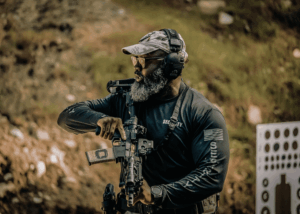 that particular route of self-protection. It is the beginning of a journey of responsibility. Without training, without the proper mindset, without the wisdom to discern when and how to act, a gun is nothing more than a dangerous object that makes you more of a liability than an asset. True self-protection requires discipline: regular practice at the range, understanding of the law, tactical training for real-world scenarios, and, crucially, a mindset of de-escalation and restraint.
that particular route of self-protection. It is the beginning of a journey of responsibility. Without training, without the proper mindset, without the wisdom to discern when and how to act, a gun is nothing more than a dangerous object that makes you more of a liability than an asset. True self-protection requires discipline: regular practice at the range, understanding of the law, tactical training for real-world scenarios, and, crucially, a mindset of de-escalation and restraint.
When approached with humility and respect, self-defense training enhances the full spectrum of a man’s health. It builds situational awareness, sharpens reflexes, boosts confidence, and fosters emotional regulation under stress. It teaches a man to be the calmest person in the room, because he knows he can act if necessary.
Readiness also goes beyond responding to active threats. There’s a sense of daily confidence that permeates every area of your life. Whether you’re walking your kids through a crowded festival, taking your spouse out for dinner in a busy city, or simply navigating daily life, the knowledge that you are capable of protecting those around you brings an undeniable peace of mind.
Beyond the Gun: The Importance of Medical Preparedness
One area often neglected in conversations about self-defense is medical preparedness. If you’re willing to carry a tool capable of taking life, you must be equally prepared to save life. In any violent encounter, there is a very real possibility that you, someone you love, or even an innocent bystander could be injured.
Every responsible man should own and know how to use a basic trauma kit. This isn’t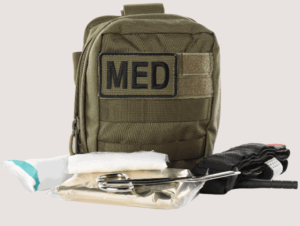 just about gunfights; car accidents, natural disasters, and freak injuries happen far more often than violent crime. Having tools like a tourniquet, chest seals, clotting agents, and basic wound care supplies – and knowing how to use them – can be the difference between life and death.
just about gunfights; car accidents, natural disasters, and freak injuries happen far more often than violent crime. Having tools like a tourniquet, chest seals, clotting agents, and basic wound care supplies – and knowing how to use them – can be the difference between life and death.
Basic trauma courses are widely available, affordable, and incredibly empowering. Learning to control bleeding, clear airways, and stabilize trauma victims not only makes you a better protector, it also connects you more deeply to your role as a provider and guardian.
Additionally, building a home first-aid kit that goes beyond simple band-aids and antiseptic cream is crucial. Include items like emergency blankets, splints, burn treatments, and oral rehydration salts. In crisis scenarios, even basic medical intervention can extend someone’s life long enough for professional help to arrive.
The Broader Conversation: A Framework for True Protection
When we zoom out, we see that self-defense is just one pillar of a larger structure: preparedness. A man who trains with his weapon but can’t change a tire, start a fire, filter water, or administer first aid is only halfway prepared to care for his loved ones.
True preparation means:
- Physical fitness: Can you sprint, carry, lift, and move under pressure?
- Medical knowledge: Can you save a life until help arrives?
- Resourcefulness: Can you solve unexpected problems without panicking?
- Situational awareness: Can you recognize a threat before it escalates?
- Emotional regulation: Can you stay calm when others can’t?
- Crisis communication: Can you guide panicked individuals to safety with clear instructions?
- Financial preparedness: Have you saved resources for emergencies, whether natural disasters or economic downturns?
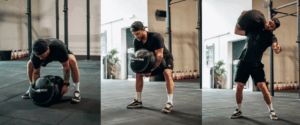
Preparedness extends into every corner of life. It’s about becoming the man who others can rely on – not just in moments of violence, but in any form of adversity. And this mindset reinforces every aspect of personal growth: leadership, self-confidence, resilience, and wisdom.
Being prepared is not a paranoid lifestyle. It’s a liberating one. It allows you to live more confidently, travel more freely, and sleep more soundly, knowing that you have taken ownership of your role as a protector.
Protecting and Providing: The Ultimate Expression of Love
At the heart of this entire conversation is love. Not fear. Not violence. Love.
You prepare not because you expect the worst, but because you refuse to be helpless if the worst comes. You train because you want to come home to your family every night. You invest in skills, gear, and readiness because your loved ones deserve a guy who is capable, calm, and committed to their safety.
Love isn’t passive. It demands action. It asks for vigilance, skill, and readiness. To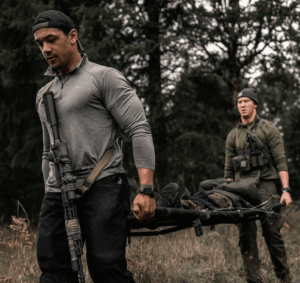 truly love someone is to be willing to protect them, not just emotionally or financially, but also physically when necessary.
truly love someone is to be willing to protect them, not just emotionally or financially, but also physically when necessary.
This mindset shifts the entire conversation around men’s health. It’s not just about eating well, lifting weights, or meditating. It’s about building yourself into someone that others can depend on when the stakes are highest.
In a world that often teaches men to outsource their safety to others – to “wait for the authorities” or “trust the system” – stepping up and saying, “I am responsible,” is a radical, powerful act.
Action Steps to Begin Your Journey
If this resonates with you, start small but start now. Here are a few concrete steps to invest in your role as protector and provider:
- Take a Basic Firearms Course: Find a reputable instructor who prioritizes safety, legality, and de-escalation.
- Build a Trauma Kit: Research high-quality kits or build your own. Learn how to use every item inside it.
- Get CPR and First Aid Certified: This is low-cost, widely available, and could save lives.
- Train Regularly: Shooting is an incredibly perishable skill. Fitness is too. Make both regular part of your routine.
- Study Situational Awareness: Books like “Left of Bang” offer seriously invaluable insights that most of us are not taught these days.
- Create an Emergency Plan: Have contingency plans for your home, workplace, and family.
- Mentor Others: Share your knowledge. Empower your loved ones to be more prepared too.
Preparedness is not just about having the right tools. It’s about the right mindset – one of calm readiness and loving responsibility.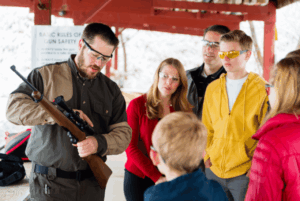
Conclusion: A Healthier Kind of Man
Investing in self-protection, medical preparedness, and general readiness isn’t about living in fear – it’s about living in truth. It’s about recognizing that while you cannot control every event, you can control your readiness to meet it.
Being a man today means more than providing income or lifting weights. It means embracing the full weight of responsibility for yourself and those you love. It means being strong enough to fight if you must, skilled enough to heal if you can, and wise enough to walk away whenever possible.
Prepared, not paranoid. Strong, not aggressive. Ready, but at peace.
That’s the kind of man the world needs. And that’s the kind of health every man should pursue.








